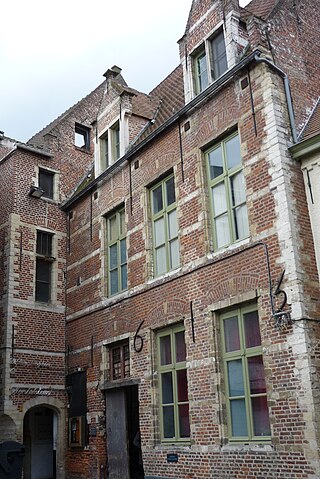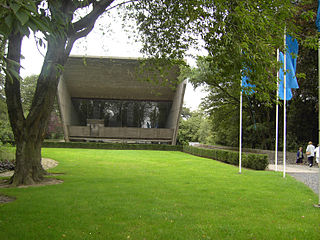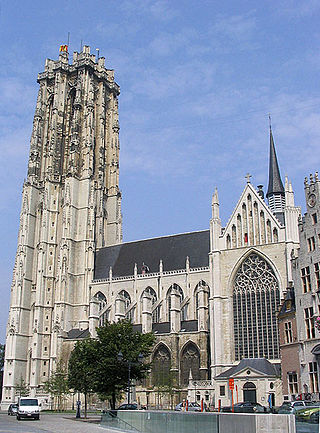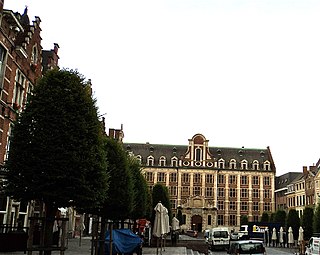
Zaventem is a municipality in the province of Flemish Brabant, in the Flemish region of Belgium. It is located in the Dijleland area, one of the three large recreational areas which together form the Groene Gordel around the Brussels-Capital Region. The municipality comprises the subdivisions or deelgemeenten of Nossegem, Sint-Stevens-Woluwe, Sterrebeek and Zaventem proper. The municipality is a suburb of Brussels, and Sint-Stevens-Woluwe directly borders the city, specifically the Woluwe-Saint-Lambert municipality.

Diest is a city and municipality located in the Belgian province of Flemish Brabant. Situated in the northeast of the Hageland region, Diest neighbours the provinces of Antwerp to its North, and Limburg to the East and is situated around 60 km from Brussels. The municipality comprises the city of Diest proper and the towns of Deurne, Kaggevinne, Molenstede, Schaffen and Webbekom. As of January 1, 2006, Diest had a total population of 22,845. The total area is 58.20 km2 which gives a population density of 393 inhabitants per km2.

The Collegium Trilingue, often also called Collegium trium linguarum, or, after its creator Collegium Buslidianum, is a university that was founded in 1517 under the patronage of the humanist, Hieronymus van Busleyden. The three languages taught were Latin, Greek and Hebrew. It was the model for the Collège de France founded in 1530. It is located in Leuven, Belgium.

The Hof van Savoye or Palace of Margaret of Austria is an early 16th-century building in Mechelen, Belgium. It was one of the first Renaissance buildings in Northern Europe.
Rameyen Castle is a castle on a lake in Gestel, part of the municipality of Berlaar, in the province of Antwerp, Belgium. It was once owned by Nicolaas Rubens, Lord of Rameyen, who died in the castle. Nicolaas was the second son of Peter Paul Rubens.

Kerselare is a hamlet and pilgrimage site in Edelare, a village belonging to the municipality of Oudenaarde in the province of East Flanders, Belgium. Kerselare is located on the Edelareberg, the highest point of Edelare

Brabantine Gothic, occasionally called Brabantian Gothic, is a significant variant of Gothic architecture that is typical for the Low Countries. It surfaced in the first half of the 14th century at St. Rumbold's Cathedral in the city of Mechelen.

Beschermd erfgoed is the official term to describe Flemish National Heritage Sites listed by law to protect and spread awareness of Belgian cultural heritage, specifically in Flanders. The term is also used nationwide to refer to national heritage sites. Because Belgium is officially a tri-lingual country, the other nationwide terms used in the rest of the country are the French term Bien classé and the German term Kulturdenkmal.

St John Berchmans University College, locally known as Jezuietenhuis or Lerkeveld, is an educational institution run by the European Low Countries Province of the Society of Jesus in Heverlee, outside Leuven. It was built in 1958 by Jos Ritzen, who worked with Alphons Boosten. It began as a philosophy and theology college for the Jesuits and housed their archives.

St Anne's College was one of the colleges of Leuven University, now listed as built heritage of Flanders, Belgium.

The Irish College of St Anthony, in Leuven, Belgium, known in Irish: Coláiste na nGael i Lobháin, Latin: Hibernorum Collegii S. Antonii de Padua Lovanii, French: Collège des Irlandais à Louvain and Dutch: Iers College Leuven, has been a centre of Irish learning on the European Continent since the early 17th century. The college was dedicated to St. Anthony of Padua.

Trinity College was one of the colleges of Leuven University, dedicated to preliminary studies in the liberal arts. The college was established by the university authorities in 1657 to replace the "Collège de Gand" founded by Frans van de Nieulande in 1559, which had closed in 1655 for lack of funds. Building began in 1658, under the supervision of Jan du Can and Adriaan van Mechelen, and from 1659 the college was housed on the Old Market. It was sometimes known as "Collegium Novum". The college was sequestered when the university was closed down in 1797 during the French occupation. The buildings were sold at public auction in 1802. The southern wing, added in 1684, was demolished in 1813. The final remnants of the 17th-century buildings were destroyed by aerial bombardment in May 1944. Since 1843 a Josephite secondary-school, Heilige Drievuldigheidscollege, has stood on the location.

Saint Ivo's College was a college at the Old University of Leuven that provided accommodation and facilities for poor students in the Faculty of Law. The founder was Robertus de Lacu, originally from Ghent, who had been professor of canon law since 1463. The college was dedicated to Ivo of Kermartin, the patron saint of lawyers, and was used by the law faculty for faculty meetings and ceremonies. The original library was destroyed by marauding Spanish soldiers in 1578, during the Dutch Revolt.
The Major Seminary in Ghent was an institution for the training of Catholic clergy for the diocese of Ghent, first founded in 1569. It has been established at three different locations in the city. Since 2006 diocesan clergy from Ghent have been trained in Leuven.
Henri-Joseph Rega (1690–1754) was a professor of medicine and rector of Leuven University, in the Habsburg Netherlands, where he established a botanical garden, laboratories for chemistry and physics, and an anatomical theatre, as well as adding a new wing to the University Hall.

Liège College, founded 1605, was a college for the more academically inclined students of theology from the Diocesan Seminary of Liège to study at the University of Leuven.

The Colonial University of Belgium was an institute of higher education located in Antwerp. Founded in 1920, the institute was established to prepare students for a careers as colonial functionaries in the Belgian Congo and Ruanda-Urundi. It was renamed the University Institute of Overseas Territories in 1949. It was dissolved in 1962.

The Diocesan Pastoral Centre Mechelen is a centre for pastoral activities and ecclestical administration, which also houses the diocesan archive of the Archdiocese of Mechelen-Brussels. It is located on the two-acre site of what was formerly the Major Seminary in Mechelen, an institution for the training of Catholic clergy in the archdiocese from 1595 to 1970. Since 1936, increasingly extensive parts of the site have been listed with the status of a protected monument.

Arras College was a college at the Old University of Leuven that provided accommodation for poor students in the Liberal Arts who intended to train for the priesthood. The founder was Nicolaus Ruterius, Bishop of Arras, a native of the Duchy of Luxembourg who had been chancellor of the university and provost of St. Peter's Church, Leuven.
















